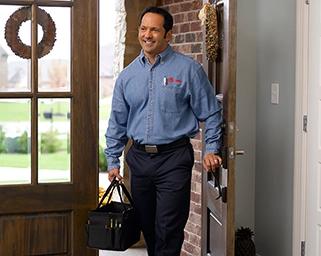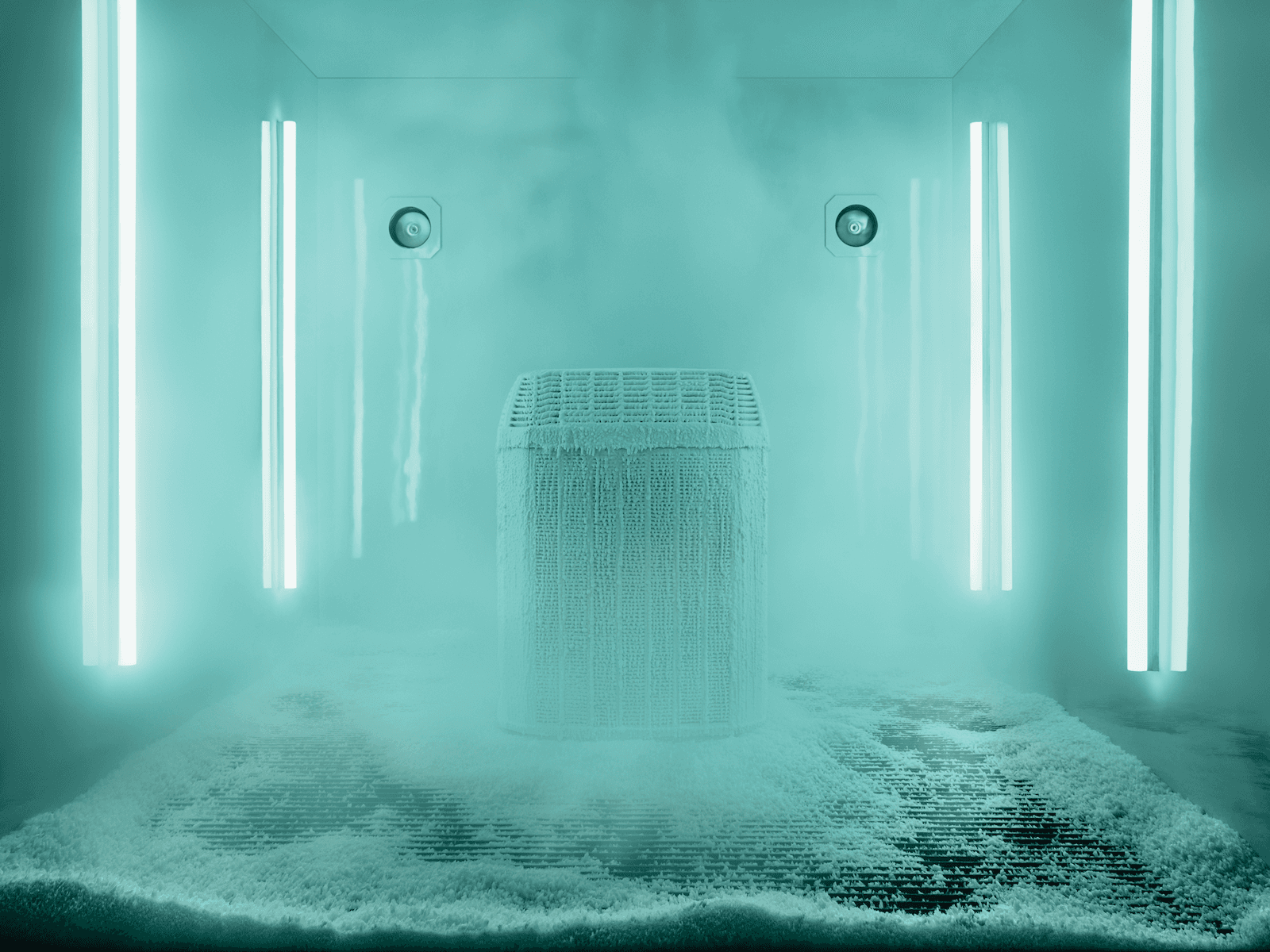Air Conditioning Replacement or Repair: What’s Right for You?
Find out when it’s right to replace your old HVAC system and when a repair is in order.
If a failing AC system no longer keeps your home comfortable, it may be time to consider air conditioning replacement. But before shelling out money on AC replacement, arrange to have several HVAC companies take a closer look at your current system to determine whether a repair or replacement would be your best option.
In this article, you’ll learn about:
- The $5,000 Repair or Replace Rule
- When Air Conditioning Replacement May Be the Best Option
- AC Replacement Cost
- HVAC Financing
- When Air Conditioning Repair May Be the Best Option
The $5,000 rule
The $5,000 rule is a rule of thumb in the HVAC industry to help homeowners decide whether HVAC repair or HVAC replacement makes more sense in the long run.
The $5,000 rule: Multiply the age of your equipment by the estimated repair cost. If the number is more than $5,000, then you should consider replacing your unit. If it’s less, a repair may be the answer. For example:
- A system that is 10 years old and has a repair cost of $300 = $3,000. It’s probably best to repair it.
- A system that is 10 years old and has a repair cost of $600 = $6,000. You should likely consider a replacement.
When air conditioning replacement may be the best option
Several factors may indicate that now is the time to replace your AC unit. Keep reading to learn more and how to make an informed decision.
Age of the unit
The older your air conditioner is, especially if it's more than 10 years old, the sooner you should consider replacing the equipment. An older system may frequently break down, and over time, the manufacturer might discontinue certain mechanical parts. Not being able to replace broken parts would be a key sign it’s time to replace your air conditioner.
High repair costs
As your air conditioner ages, the unit may need repairs more often. If you feel that you’re putting too much time and money into frequent repairs, you may want to consider investing in a new unit. Refer to the $5,000 rule above.
Expired warranty
If your HVAC warranty has expired, you’re responsible for the full amount of repair costs. Most warranties last 5-10 years, so if your unit is older, the warranty has likely expired.
Increased energy bills
AC systems can lose efficiency over time and older units may use more electricity than they did when they were new. You may notice an increase in your energy bills as your AC unit becomes less efficient. Damage to the unit, such as a leak, could also cause the unit to work overtime to cool your home, which could raise your bill. Either way, expensive bills may be a good reason to purchase a new unit.
Low SEER rating
While a low SEER rating doesn’t always indicate inefficiency, you may want to consider an upgrade if your unit scores lower than the minimum standard rating of 13. A SEER2 rating measures the energy efficiency of air conditioning units. The minimum rating increased in 2023, putting older units even further below standard.
Freon® use
The U.S. Environmental Protection Agency (EPA) phased out the production or importation of an older refrigerant called R22, or Freon® in 2020. This is after the EPA In 2010, the U.S. stopped the sale of new air conditioning units that use R-22. If your AC unit uses Freon®, not only is the unit at or near the end of its lifespan, but you may not be able to access Freon® when your unit needs a repair.
R-410A use
R-410A is the refrigerant that replaced R-22 in cooling units after 2010. Because of new regulations, R-410A is also being phased out and will be replaced with a more sustainable refrigerant. In residential units, the new HVAC industry standard refrigerant will be R-454B.
Because the refrigerant transition will happen slowly, there will be an ample supply of R-410A for years to come. So if your AC unit is less than 10 years old and repairs are minor, stick with AC repair. If your unit is approaching 15 years old, AC replacement might be the better option.
AC replacement cost
The cost to replace an AC unit is a major factor in the decision-making process of whether to repair or replace it. Air conditioning replacement costs would include the price of the unit plus installation fees. Your costs could range from $5,800 to $17,000 depending on the system you choose. However, many variables would impact your final price, including but not limited to:
- Your location
- The difficulty of the installation
- The size of your home
- Potential ductwork modifications
- Necessary electrical upgrades
- If you choose a zoned HVAC system
If you choose a qualified matched system, you may be eligible for federal tax credits, state rebates, and utility rebates. In addition, HVAC manufacturers or dealers may offer special discounts or rebates to customers. For example, you can check out Trane’s savings and discounts to see how much you could save.
Air conditioning systems are generally made up of two matching components — an indoor furnace or air handler and an outdoor air conditioner or heat pump. Replacing either the indoor or the outdoor unit without replacing the other could reduce the system’s overall efficiency and cause additional failure.
If you need to replace your central air conditioner, you’ll likely need to replace the furnace as well to ensure you have a matching set. Keep this in mind if you’re considering an AC replacement.
Upgrading your AC unit, or any piece of your HVAC system, is an investment that will save you money over time. Here’s how much you could save on energy costs in one year when you buy a new air conditioner or furnace:
*AC results based on PickHVAC’s SEER Savings Calculator for a 3-ton 22 SEER air conditioner versus the industry standard 14 SEER air conditioner in St. Louis, MO. Furnace results based on PickHVAC’s AFUE Savings Calculator for a 95% AFUE-rated furnace compared to a 60% AFUE-rated furnace in a 2,700-square-foot home in St. Louis, MO.
HVAC system replacement financing
In addition to the cost savings you can achieve by getting a more efficient system, and applying tax credits and rebates to the cost, you will also want to consider your HVAC financing options. There are several ways to pay for your new system - just decide what’s best for you.
When air conditioning repair may be the best option
There are also several factors to consider that may make AC repair a better option than replacing the unit. Let’s take a look.
Age of the unit
If your AC unit is less than 10 years old, repairing it when issues arise will be the most cost-effective option in the majority of cases. It still has a lot of life left!
Repair costs
Refer to the $5,000 rule again. If you only have repairs every few years and the cost isn’t overwhelming, air conditioning repair may be the best option.
Warranty
If your warranty is still good, that can help offset the cost of parts replacement. Check your warranty online or refer to the printed version you got when the unit was installed to see what’s covered. Also, check to see if you have a base warranty of 5 years or a longer warranty of 10 or 15 years. Repairing a unit that is still under warranty is likely the most cost-effective option.
Energy bills
If you notice your energy bills suddenly increasing, you may want to get your air conditioner checked out by your local HVAC professional. Make sure to change the filter regularly and schedule AC maintenance in the spring to keep your unit running at its most efficient.
Schedule AC repair or a quote for AC replacement
Contact your local Trane dealer to schedule air conditioning repair or get a quote for AC replacement. They’ll run the numbers for you to help you make an informed decision.




